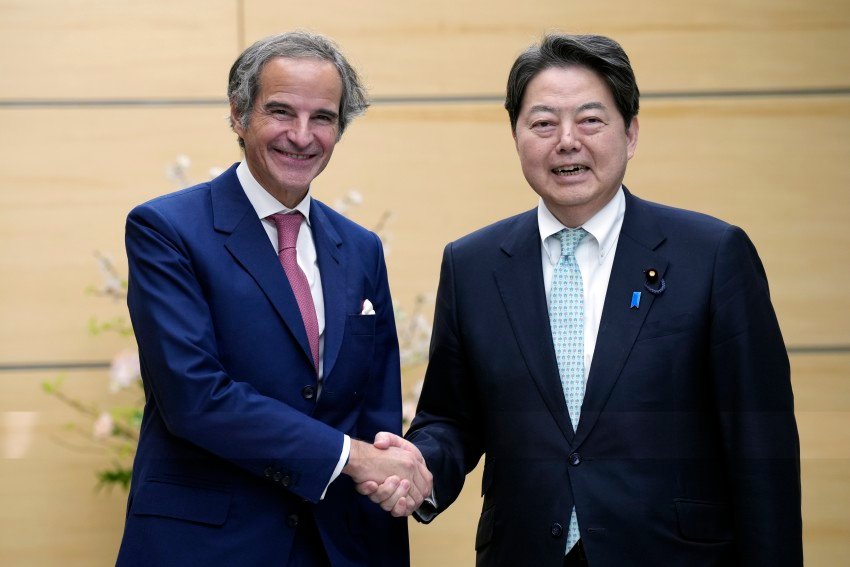U.N. nuclear chief tells Japan transparency ‘very important’ in Fukushima nuclear plant’s water discharges
TOKYO – The head of the U.N. atomic agency on Tuesday emphasized to Japan’s government the importance of transparency in its ongoing discharges of treated radioactive wastewater at the ruined Fukushima Daiichi nuclear power plant.
International Atomic Energy Agency Director-General Rafael Grossi also expressed support for increasing Japan’s nuclear capacity as the country looks to it as a stable, clean source of power.
Grossi is in Japan for the first time since releases of the treated water began in August. His visit comes one day after Japan marked 13 years since the March 11 earthquake and tsunami triggered the Fukushima disaster.
The 2011 disaster damaged the Fukushima plant’s power supply and reactor cooling functions, triggering triple meltdowns and causing large amounts of radioactive wastewater to accumulate. After more than a decade of cleanup work, the plant began discharging the water after treating it and diluting it with large amounts of seawater on Aug. 24, starting a process that’s expected to take decades.
The discharges have been opposed by fishing groups and neighboring countries including China, which banned all imports of Japanese seafood immediately after the release began.
Japan has sought the IAEA’s help with safety monitoring and evaluation to allay concerns.
Grossi will examine the discharge and sampling facility Wednesday after meeting with local residents. He last visited the plant in July after issuing an IAEA review predicting only negligible impact from the discharges. The IAEA comprehensive report later concluded that the discharges have satisfied international safety standards.
It is “very important to show the transparency of this process,” Grossi told Economy and Industry Minister Ken Saito.
Grossi also offered Japan technical assistance to improve the idled Kashiwazaki-Kariwa nuclear power plant in Japan’s northcentral region of Niigata, run by the Fukushima Daiichi operator. It and the government are keen to restart it soon.
The Kashiwazaki-Kariwa plant’s No. 6 and No. 7 reactors had passed regulators’ safety tests for a restart, but they were suspended from making further preparations after safeguarding problems surfaced in 2021. Those lasted until December, when the regulators acknowledged improvement.
IAEA is sending a team of experts to the plant later this month to assist Tokyo Electric Power Company Holdings’ effort to gain public trust.
“We want to be of assistance in helping Japan’s nuclear capacity to be up and running as soon as possible,” Grossi told Saito.
The restart remains uncertain because it is subject to host community’s consent. The Jan. 1 earthquake in the nearby Noto region rekindled safety concerns and prompted nuclear regulators to order a review of evacuation plans around nuclear facilities nationwide.
Prime Minister Fumio Kishida’s government has reversed earlier plans for a nuclear phaseout and is accelerating the use of nuclear power in response to rising fuel costs related to Russia’s full-scale invasion of Ukraine and pressure to meet decarbonization goals.
Grossi will meet with Foreign Minister Yoko Kamikawa on Thursday and is expected to discuss cooperation in nuclear disarmament, non-proliferation, North Korea and Iran as well as peaceful use of atomic energy.
Japan also wants to provide financial support for the IAEA’s effort to protect Ukrainian nuclear plants from Russia’s war, officials said.
Earlier Tuesday, Grossi in his meeting with Environment Minister Shintaro Ito pledged the IAEA’s cooperation in the disposal of radioactive soil that came out of decontamination across Fukushima.
The soil has been in an interim storage facility in Fukushima. A government plan to recycle it for road construction and other public works after safety tests has met fierce protests. The government has promised a final disposal plan outside of the prefecture by 2045.
© Copyright 2024 The Associated Press. All rights reserved. This material may not be published, broadcast, rewritten or redistributed without permission.

